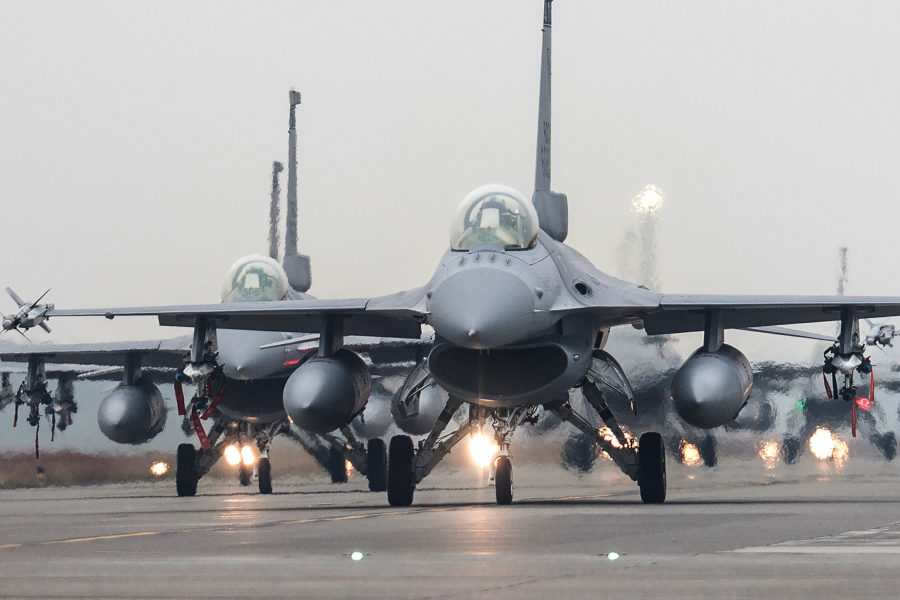The risk of war with China is increasing, experts said May 1. The most likely cause: a U.S.-Chinese conflagration in the Taiwan Strait that could spiral out of control.
“The prospects for war are growing,” Bonnie Glaser, director of the Trans-Pacific program of the German Marshall Fund of the U.S. said during a Brookings Institution webinar.
“I don’t think it would start with a Taiwanese declaration of independence,” she said, because the Taiwanese electorate has shown little enthusiasm for such a declaration, knowing that China would probably take military action in response. There’s equally little appetite to sign up for Beijing’s so-called one nation, two systems concept, especially after the People’s Republic stridently reneged on such a promise in Hong Kong.
Rather, Glaser argued, the Strait is “really the only potential trigger of a major war between the United States and China.”
“We have never seen two nuclear powers go to war,” she said, adding she had little confidence “escalation could be controlled, so this is the most worrisome scenario.” Glaser was referring to encounters between U.S. and Chinese aircraft and warships in the South China Sea and other locations in recent months, particularly after the visit of former House Speaker Nancy Pelosi (D-Calif.) to Taipei.
Glaser, along with Ryan Haas and Richard Bush of Brookings, were rolling out a new book, “U.S.-Taiwan Relations: Will China’s Challenge Lead to a Crisis?”
Glaser said the U.S. must have an informed debate on what is necessary to prevent war with China—something she and her co-panelists thought was possible.
Haas said China would prefer unification Taiwan, which it views as a breakaway province, to be as bloodless as possible. A war could devastate the Taiwanese economy—especially in the vital semiconductor industry.
“From Beijing’s perspective, their preference would be to try to isolate Taiwan as an issue between Taiwan and China and to just deal with it on their own,” and eventually “impose their will on the people of Taiwan,” he said.
The U.S. has a policy of strategic ambiguity regarding military intervention in a possible Chinese invasion of Taiwan, a position Haas argued the U.S. should maintain. The U.S. argues China should not unilaterally upend the status quo, a policy supported by many Taiwanese.
“What would the United States gain by foreclosing a potential solution to cross-strait differences and what costs or risks would we incur in the process?” Haas said. “The people of Taiwan have no enthusiasm for near-term unification. [They] also are very pragmatic and have shown through repeated elections that they also don’t have a lot of appetite for declarations of independence.”
Haas said the U.S. shouldn’t place Taiwan’s future in America’s hands.
“The goal of US policy and strategy isn’t to solve the Taiwan problem,” he said. “The people of Taiwan, mainland China, they’re not looking for the United States to play a mediating role.”
“This is an artifact of an unfinished Civil War,” Haas added. “The purpose of American strategy and policy is to keep a path open for a resolution to be found by the protagonist themselves.” That could take years, decades, or centuries, he said.
Beijing doesn’t like “this being an annex of US-China competition,” Haas added. “They really don’t like Taiwan being embedded into a broader regional or global framework, because that means that others around the world have a stake in what happens in the Taiwan Strait,” he said. He praised the Biden Administration, saying it’s done “a commendable job” of helping to turn Taiwan into an issue in which countries around the globe have a stake in preserving peace.
China seems willing to stick with its influence campaign to try to win over the Taiwanese electorate, the panelists said, and likely will if the U.S. does not insist on Taiwan becoming an independent country—counter to current U.S. policy. If the U.S. declares otherwise, China would view that as a bid to control Taiwan as a strategic outpost in China’s front yard, and this would almost certainly be met with a military response.
So far, President Biden’s repeated pledge that the U.S. would aid Taiwan if it was invaded has not reassured Taiwan and only irritated Beijing, the authors said.
Glaser noted that the U.S. needs to take a whole-of-government approach to the issue, and not simply a military one. Beijing, she noted, has been waging an information and cyber war, trying to diminish Taiwanese confidence in their own government, and undermining faith in the U.S.
Beijing’s goal is to get the Taiwanese electorate to be accepting of unification as inevitable and a more acceptable option than war, and a strong percentage seem to be swayed by this message, she said.
Asked if reassuring China that the U.S. has no designs on Taiwan as a pro-American outpost and possible military base would be a successful approach, Haas answered that “reassurance is only useful for a party that wants to be reassured, and I think that Beijing finds it more convenient to not accept our expressions of restraint and prefer to just call us liars.”
Haas told the audience that “Taiwan has a say in this. And if, in 2024, they were to elect a president who was more to Beijing’s liking … a lot of emphasis on military issues would disappear, because we would be in a zone of more cooperation than hostility.” However, there’s little evidence that the Taiwanese are headed in that direction, and are heeding U.S. advice to make themselves a military “porcupine,” Glaser said.
